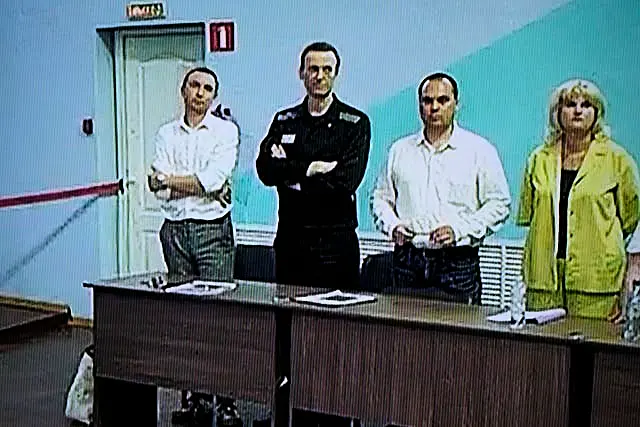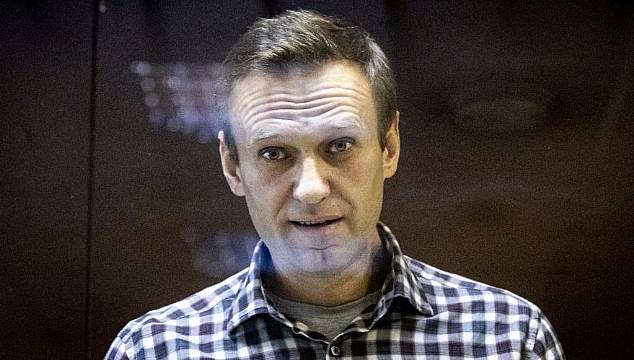A Russian court convicted imprisoned opposition leader Alexei Navalny on charges of extremism and sentenced him to 19 years in prison on Friday.
Mr Navalny is already serving a nine-year term on a variety of charges that he says were politically motivated.
The new charges related to the activities of Navalny’s anti-corruption foundation and statements by his top associates.
It was his fifth criminal conviction and the third and longest prison term handed to him, all of which his supporters see as a deliberate Kremlin strategy to silence its most ardent opponent.

It was not immediately clear whether he would serve this new term concurrently with his current sentence on charges of fraud and contempt of court.
The prosecution had demanded a 20-year prison sentence, and the politician himself said beforehand that he expected to receive a lengthy term.
Mr Navalny was also sentenced in 2021 to two and a half years in prison for a parole violation. The extremism trial took place behind closed doors in the penal colony east of Moscow where he is imprisoned.
Mr Navalny appeared in the courtroom on Friday afternoon, wearing prison garb and looking gaunt, but with a defiant smile on his face.

As the judge read out the verdict, the politician stood alongside his lawyers and his co-defendant with his arms crossed, listening with a serious expression on his face.
It took the judge less than 10 minutes to announce the verdict and the sentence – something that in Russia usually takes hours and even days.
The 47-year-old Navalny is president Vladimir Putin’s fiercest foe and has exposed official corruption and organised major anti-Kremlin protests.
He was arrested in January 2021 upon returning to Moscow after recuperating in Germany from nerve agent poisoning that he blamed on the Kremlin.

Mr Navalny’s allies said the extremism charges retroactively criminalised all of the anti-corruption foundation’s activities since its creation in 2011.
In 2021, Russian authorities outlawed the foundation and the vast network of Mr Navalny’s offices in Russian regions as extremist organisations, exposing anyone involved to possible prosecution.
One of Mr Navalny’s associates, Daniel Kholodny, stood trial alongside him after being relocated from a different prison. It was not immediately clear what sentence was handed to Mr Kholodny.
Mr Navalny rejected all the charges against him as politically motivated and accused the Kremlin of seeking to keep him behind bars for life.
On the eve of the verdict hearing, Mr Navalny released a statement on social media, presumably through his team, in which he said he expected his latest sentence to be “huge – a Stalinist term”.
Under the Soviet dictator Joseph Stalin, millions of people were branded “enemies of the state”, jailed and sometimes executed in what became known as the “Great Terror”.
In his statement, Mr Navalny called on Russians to “personally” resist and encouraged them to support political prisoners, distribute flyers or go to a rally.
He told Russians that they could choose a safe way to resist, but he added that “there is shame in doing nothing. It’s shameful to let yourself be intimidated”.
The politician is currently serving his sentence in a maximum-security prison: Penal Colony No. 6 in the town of Melekhovo, about 140 miles east of Moscow.
He has spent months in a tiny one-person cell, also called a “punishment cell”, for purported disciplinary violations, such as an alleged failure to button his prison clothes properly, introduce himself appropriately to a guard or to wash his face at a specified time.
On social media, Mr Navalny’s associates urged supporters to come to Melekhovo on Friday to express solidarity with the politician.
About 40 supporters from different Russian cities gathered outside the colony, one of them told the Associated Press in the messaging app Telegram.
Yelena, who spoke on condition that her last name was withheld for safety reasons, said the supporters were not allowed into the colony, but decided to stay outside until the verdict as announced: “People think it’s important to be nearby at least like that, for moral support. We will be waiting.”
Mr Navalny was ordered to serve the new prison term in a “special regime” penal colony, a term that refers to the Russian prisons with the highest level of security and the harshest inmate restrictions.
It was not immediately clear when he would be transferred to such a colony from the Melekhovo prison.
By law, Navalny has 10 days to appeal the verdict, and if he does, it will not take effect until the appeal is adjudicated.
Russian law stipulates that only men given life sentences or “especially dangerous recidivists” are sent to those types of prisons.
The country has many fewer “special regime” colonies compared to other types of adult prisons, according to state penitentiary service data: 35 colonies for “dangerous recidivists” and six for men imprisoned for life.
Maximum-security colonies are the most widespread type, with 251 currently in operation.







